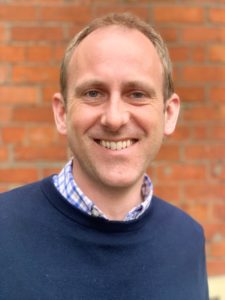James W. Newton, Series Producer and Director
James W. Newton is the Series Producer and Director for Baby Surgeons: Delivering Miracles.
Here, we catch up with him about why Wonderhood Studios, the production company behind Baby Surgeons: Delivering Miracles, wanted to make this series…
How did Baby Surgeons: Delivering Miracles come about? And why at St George’s?
There are few things as precious and remarkable as growing a new human being, and when Wonderhood Studios had the idea of following fetal surgery it felt like an incredible opportunity to be able to capture the work of these pioneering surgical teams.
We looked to approach St George’s for access due to Professor Basky and his team’s reputation for pioneering life saving surgeries, and St George’s were welcoming to our approach for the documentary series. To be able to enter into this world and tell the stories of these patients and staff felt like an incredible opportunity.
How did filming work? Did Covid-19 affect filming?
We were keen to explore how we could capture the highly complex medical stories and translate in-utero surgery into accessible viewing for audiences; we used a combination of static cameras, hand held cameras and footage from the medical fetoscopes to capture a 360 degree view of the care and treatment patients receive.
The scan room was the ‘main stage’ where both good news and bad are revealed. The emotions fly high here so you need coverage to slow things down. Alongside single camera filming, we built a bespoke three camera mini rig which we could move anywhere in the hospital very quickly. I used micro cinema cameras with local monitor/recorders, which meant that I could move around with a single camera while monitoring the coverage.
Because each rig was small, I could set them back from the action so they didn’t distract those in the room; they could also be moved into the operating theatre or labour ward more easily. As we were following multiple stories, some days we would move the rig multiple times.
St George’s worked with us to ensure we adapted quickly to the changing protocols surrounding Covid-19, and this meant that we were able to continue filming in some capacity throughout the lockdown. We gave GoPro cameras to the medical teams and showed them how to record on certain cameras on the mini-rig. We also worked closely with the women and their partners who filmed their pregnancy journeys on GoPros and their own phones at home.
Why did you want to be involved with this series?
I felt this was an opportunity to create a space for women to testify to their experiences of high risk and complex pregnancy, as a way to help others.
As a society, we struggle to talk about some of these things, in particular baby loss, however, one in four pregnancies end with baby loss and many of the women coming to fetal medicine have no reference for these experiences and there is often little material out there to turn to.
These cases are fraught with ethical and moral dilemmas and I wanted to capture this in order to give people insight and get conversations going.
What was the most interesting or hardest thing you saw during filming?
I think the most profound thing I filmed was also the hardest. Never before have I witnessed such incredible sadness followed by such overwhelming joy, as the moment when Ann-Marie who features in episode one gives birth to twins. Nine days previously one of her twins had died, the birth was always going to be challenging. But it wasn’t until she was in labour, that it became clear how things would play out. She would give birth to the baby that had died first, which she called Emily, followed by the surviving twin which she called Poppy.
It was a very special opportunity to share in a couples’ journey to try and have a family and capture their difficult experience of high risk pregnancy, something people don’t often discuss. It was hard to film and hard to witness, not least because I also have twins.


